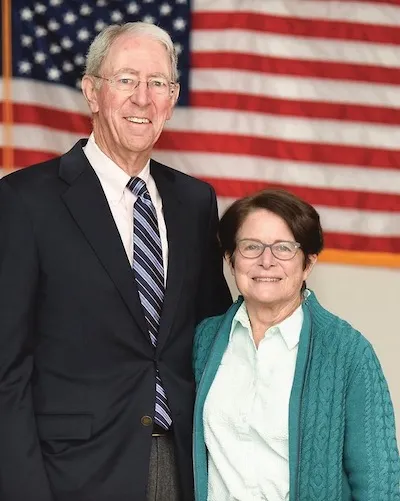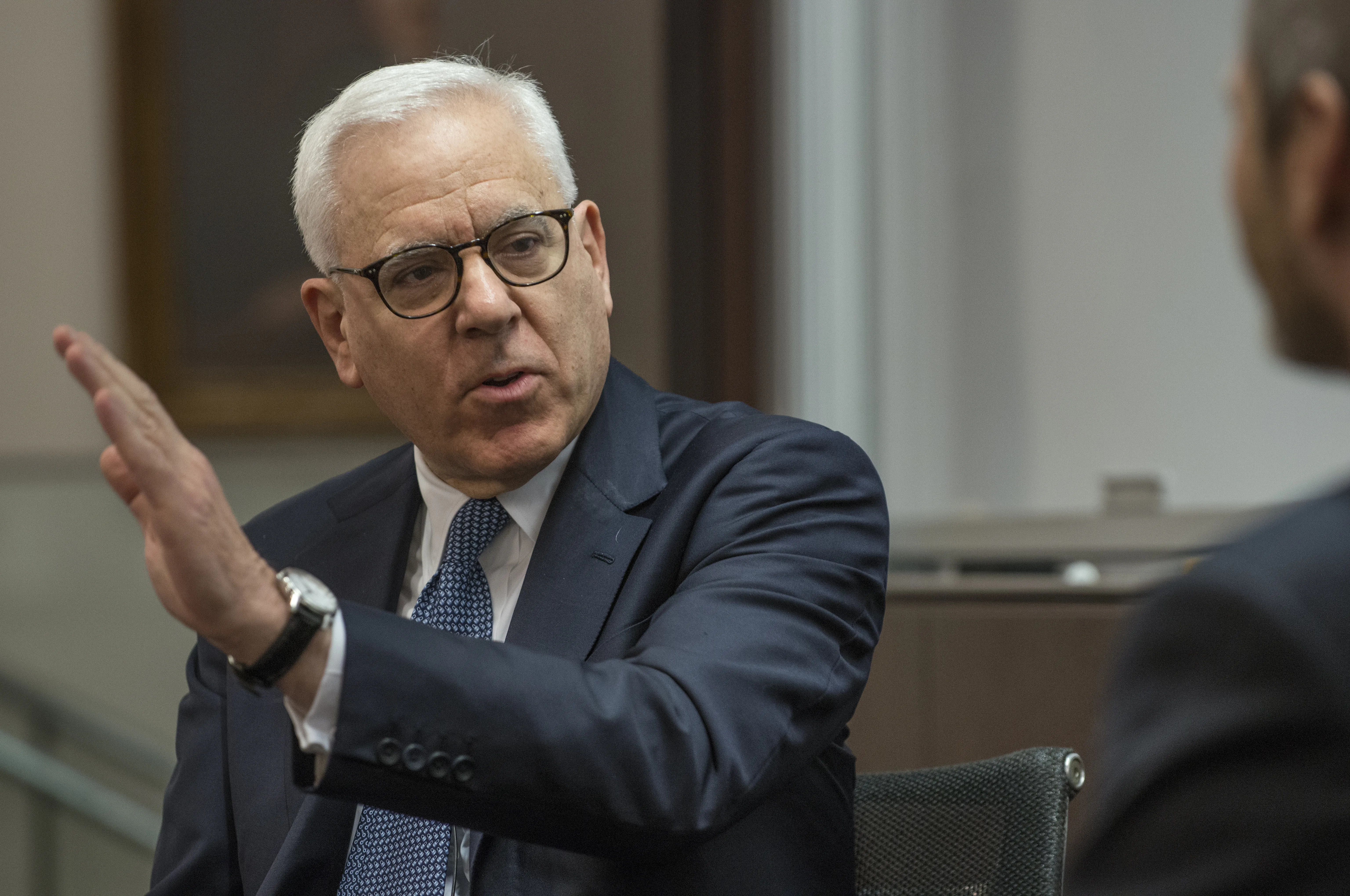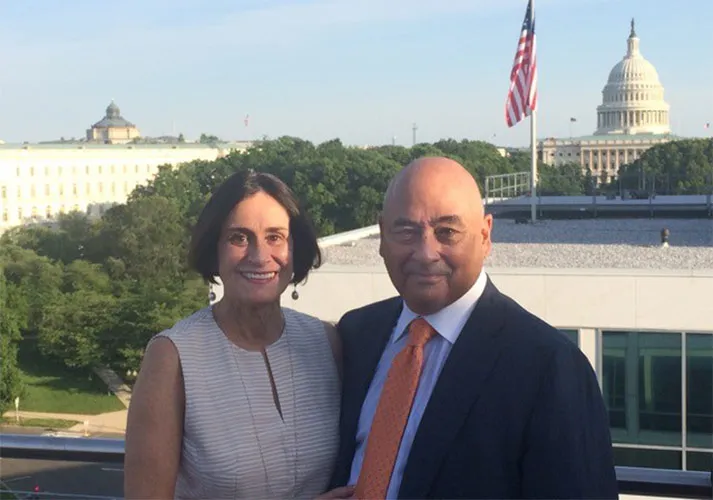Creating Business Leaders: A Plan for the Future
Dan Doctoroff, '84, is the CEO of Bloomberg L.P. He doesn’t have an MBA.
These days, that makes him highly unusual. Of the 498 CEOs of the Fortune 500 companies in 2012, fewer than 10 percent of them—46—have JDs. That is a stark change from 40 years ago, when 27 percent of Fortune 500 CEOs earned JDs. The Law School, with Doctoroff's substantial help, aims to change that.
This fall, Dean Schill announced the Doctoroff Business Leadership Program at the Law School, supported by a $5 million gift from Dan and Alisa Doctoroff. This groundbreaking academic and co-curricular program will provide all Law School students with the opportunity to develop the core analytical skills necessary to be successful as business leaders as well as business attorneys. In addition, it will provide a smaller set of students committed to careers in business with an array of mentorship, internship, and enrichment opportunities not normally found in law schools.
“There could not be a more opportune time for the Law School to develop a new and innovative business leadership program,” said Michael Schill, Dean and Harry N. Wyatt Professor of Law. “The recent upheaval in both the legal and financial markets has profoundly changed the legal profession and challenged law schools to innovate. Each law school will follow its own path to meet the needs of its students, the profession, and the world. The Doctoroff program is a key part of Chicago’s comprehensive approach to providing our students with the analytical tools to be preeminent not just in the practice of law, but also in business, government, and academic careers. Dan Doctoroff has been a phenomenally successful leader in business and public affairs, and I am proud that our new program will bear his name.”
The Doctoroff Business Leadership Program combines five substantial components in the Law School’s first-ever certificate-granting program: a business curriculum taught by many of the leading professors of Chicago’s acclaimed Booth School of Business, mentorship from alumni business leaders, first-year summer internships in business enterprises, enrichment opportunities for students enrolled in the program, and additional business-oriented experiential learning. The program will focus on preparing law students to advise, run, and create business enterprises large and small through training in entity formation, capital structure and finance, intellectual property protection, ethical and regulatory issues, business combinations, and sales. The Doctoroff Business Leadership Program will prepare Chicago Law students for all the myriad legal and business challenges of an ever-changing world.
“The Law School already attracts many of the best law students in the world,” Schill said. “Through Dan’s gift, we will now be an irresistible choice for students who are deeply committed to careers in business and finance. Dan and I both agree that the JD degree, particularly at a school like the University of Chicago, is an extraordinary preparation for any career that requires sharp analytical capabilities.”
“For much of the history of the Law School, the JD degree has been an entrance point for leadership in banking, finance, investment banks, and real estate, as well as law and public service,” Schill continued. “In recent years, with the growth of the MBA, we have seen a decline in lawyers in business. Our intention with the Doctoroff program is, if you will, to go ‘back to the future’ and reestablish the JD as a compelling option for anyone who is bright, ambitious, and ready to become a leader in business.”
A Legal Career without a Bar License
In his speech to the graduating class of 2012, Doctoroff, a recipient of the Law School’s Distinguished Alumnus Award, talked about having had five different careers since leaving the Law School—none of them requiring a bar license. After graduation he became an investment banker at Lehman Brothers, then a Managing Partner at Oak Hill Capital Partners. While at Oak Hill, he founded NYC2012, the organization dedicated to bringing the Olympic Games to New York City. He continued to spearhead the Olympic Bid when he became NYC’s Deputy Mayor for Economic Development and Rebuilding under Mayor Michael Bloomberg. After nearly seven years in that position, he joined Bloomberg L.P. as its President in 2008 and was appointed CEO in 2011.
Doctoroff's gift, he said, is about creating business leaders inside law schools. “Having served in government, as an investor and CEO—as well as working with hundreds of lawyers—I am absolutely convinced that fundamental business and financial skills are critical no matter what law school students end up doing,” he said. In recent years, the extraordinary generosity of David Rubenstein, '73, and Debra Cafaro, '82, has allowed the Law School to compete for the very best students in the nation. The Doctoroff Program, along with other new initiatives at the Law School such as the Kapnick Leadership and Professionalism Initiative, the Public Interest Program, the Clinic expansion, and increased efforts to train legal academics, provide all students with the training and skills to blossom into extraordinary professionals.
In Doctoroff’s graduation speech, he explained why the Law School is so uniquely situated to house this program— because the analytical education is already so rigorous. In encouraging the new graduates to broaden their goals, he reminded them that Chicago Law graduates have “unique” skills. “You have an intellectual discipline that pretty much no one else has,” he said. “You have learned to challenge traditional assumptions about the way things should be, and you communicate your ideas precisely and compellingly.” Those characteristics, Doctoroff said, provide Law School graduates a “golden ticket to be anything [they] are truly great at.” The new Doctoroff Business Leadership Program will only increase the value of that ticket by adding strong business acumen to the already deeply analytical Chicago Law training.
The Elements of the Program
The Doctoroff Business Leadership Program is the product of a unique year-long joint alumni/faculty planning effort chaired by Dan Doctoroff. Other alumni members included Adam Emmerich, '85, David Greenbaum, '76, Larry Neubauer, JD/MBA'95, David Rubenstein, '73, Barry Zubrow, JD'80, MBA'79, Dan Fischel, '77, and Debbie Cafaro, '82. (See sidebar for the full list of members.)
The contours of the program were created by this group and will be implemented by a faculty committee chaired by former Dean and Harry A. Bigelow Distinguished Service Professor of Law Douglas Baird. Baird said, “This program will provide a focal point for students who wish to connect their legal training to the world of business and entrepreneurship.”
The program will engage professors from the Booth School of Business such as Steven Kaplan, Philip Berger, and Emir Kamenica who will teach classes such as Entrepreneurial Finance, Accounting and Financial Management, and Business Strategy. Approximately five of these core courses will be taught each year and will be available to all secondand third-year students. The first set of courses were pilot-tested last year. The response by Law School students was enthusiastic. “Taking Professor Kaplan’s Corporate Finance course was one of the academic highlights of my 3L year,” said Lauren Fladger, '13, now a consultant with McKinsey. “I enrolled in the course in preparation for my postgrad career in management consulting, but I had no idea of how applicable the course concepts would be. Even the most basic skills I gained in the course (like becoming more nimble in Microsoft Excel and learning to always perform a sanity check on my answers) have helped me in my first few weeks in consulting.”
A small group of students (approximately 15 per class) will be admitted to the Doctoroff Business Leadership Program. They will take a carefully chosen curriculum composed of the courses taught by Booth faculty, core business law classes taught by the Law School faculty, and advanced seminars taught by leading practitioners. They will take advantage of the Law School’s transactional clinics. Students will be assigned a business mentor who will provide them with one-on-one counseling during their three years at the Law School.
In addition, students will have the opportunity to work during their 1L summers in a business setting. It is expected that some of the students will intern for their mentors’ companies, while others will find internships elsewhere. The Law School will match cohort students with these internships and will work closely with the students to ensure that these mentorship opportunities put both their legal and business training to good use, while helping them continue to develop the skills and knowledge necessary for their leadership development. “The connections and experience that will be gained in these internships will complement the analytical training received in the classroom,” Baird said.
Enrichment activities, such as lunchtime talks and professionalism programs, have been a staple of life at the Law School for decades. The program will add to the wide assortment already offered each year with programs specifically designed with Doctoroff Business Leadership Program goals in mind. Such programs might include corporate site visits, special speakers, and roundtables and panel discussions and will promote not only increased knowledge but also networking with members of the business community.
Students will be chosen based upon their intellectual ability, demonstrated interest, and experience in business and entrepreneurship. “We are looking for students who might have chosen to get an MBA or even a JD/MBA elsewhere,” Schill said, “but for whom the actual cost and the opportunity cost of that extra year is now prohibitive.”
A Partnership of Two Great Institutions
According to Baird, one of the most exciting aspects of the Doctoroff Business Leadership Program is the partnership with the Booth School. “Dan’s gift signals an era in which the Law School and Booth draw tighter connections between faculty, students, and alumni, and take advantage of the untapped synergy between two flagships of the University,” he said.
Indeed, the Doctoroff Business Leadership Program is one of two new “joint ventures” between the Booth School and Law School. Next year, thanks to the generosity of alumni Scott, JD/MBA'85, and Kathleen Kapnick, '84, all students at the Law School will benefit from leadership and professionalism training administered by Booth’s world-famous LEAD program.
A Unique Response to the Changing Market for Lawyers
The economic crisis of 2008 and its aftermath has affected both the legal profession and law schools profoundly. An oversupply of lawyers has caused the number of law school applications over the past three years to decline by approximately 29 percent. While the Law School’s applicant pool has declined by a much smaller 10 percent, Dean Schill believes it is important for the Law School to remain a leader in curricular innovation. “We are the school of Ernst Freund, Ronald Coase, Edward Levi, and Richard Posner,” Schill said. “Perhaps no law school in America has so fundamentally changed what is taught in American law schools. It is important that we stay at the cutting edge in a manner that is authentically Chicago.”
The primary response of most law schools to the changes in the marketplace for lawyers has been to vastly increase their commitment to clinical and experiential learning. At Chicago, clinical legal education is extraordinarily important, and over the past four years new clinics in environmental law, human rights, and prosecution and defense have joined our long-standing clinical programs. But the School’s approach is multidimensional. According to Schill, “any curricular change at this Law School must focus first and foremost on analytical education. What is missing in legal education today is rigorous training in empirical methods, financial analysis, finance, and decision sciences; we need to apply our focus on deep analysis to that part of training as well. To the extent lawyers have had such knowledge, it has usually come from experience, rather than education.” Baird agrees: “This program follows the great interdisciplinary tradition of the Law School and ensures that the next generation of graduates will be ready for the challenges that await them.”
Schill expects that this program will make the Law School even better at training a new generation of Dan Doctoroffs. “The Law School has always been fantastic training for businesspeople,” Schill said, “because it teaches problem solving and getting to the root of issues. What has been missing from the equation is bringing that rigorous analytical training to bear on the core business curriculum, so that Law School alumni have not only the well-trained minds but also the technical skills to become business leaders. The bar has been raised in that arena, and I expect that through the new Business Leadership Program, our students will rise to that challenge.”


